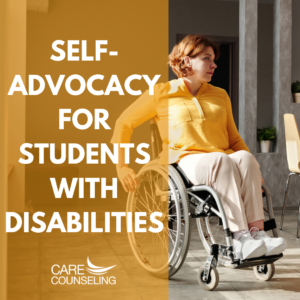Self-Advocacy for Students with Disabilities
 Self-advocacy is a skill that is necessary for students with disabilities to regularly practice in the school setting. The following will help equip students with information and resources to help increase their confidence in self-advocacy.
Self-advocacy is a skill that is necessary for students with disabilities to regularly practice in the school setting. The following will help equip students with information and resources to help increase their confidence in self-advocacy.
Increase Understanding of Yourself
Learning more about yourself such as your strengths and skill deficits is important and will help enable you to identify possible accommodations when advocating for your learning needs. Knowing more about your overall cognitive abilities, learning interests, personal interests, personality traits, and learning style are other areas to learn more about.
- If you struggle to identify these areas, try asking for feedback from several people who know you well such as a parent, mentor, close friend, teacher, or therapist.
- Try scheduling a time to meet with someone from your school who can help you explore these areas. Many schools have student services or academic and career services centers. School-based counselors can also support in this area.
- PACER Center has resources for transition-age students that include needs, strengths & skills, interests, and plans including a comprehensive manual and snapshot version for students.
https://www.pacer.org/parent/php/PHP-a55.pdf
https://www.pacer.org/parent/php/PHP-a56.pdf
Be Familiar with Your Diagnosis
Your diagnosis will provide more information for the types of supports that may be helpful; however, diagnoses present differently in how they impact educational functioning. Knowing your diagnosis and any co-occurring diagnoses is essential in addition to being able to describe how this affects learning and academic achievement.
- There are some great resources online to learn more about mental health and diagnoses. Try accessing reputable sources such as the following:
The National Institute of Mental Health https://www.nimh.nih.gov/
The National Alliance on Mental Illness https://www.nami.org/Home
- Ask your therapist to explain more about your diagnosis. A psychoeducational objective can be part of your treatment plan to help you thoroughly understand your diagnosis and the symptoms that are related to your diagnosis.
Connect with Self-Advocacy Resources
Video modeling is a great way to learn self-advocacy skills by watching videos of others practicing skills. One can then use rehearsal or role-playing to practice this skill. Working with a therapist can help you manage anxiety and use social communication skills. Here are several videos that show a high school student with a disability utilizing their support systems and the Individualized Education Programs process to advocate and communicate:
https://www.pacer.org/students/transition-to-life/advocating-for-myself.asp
Some awesome resources through PACER Center include a sample self-advocacy plan. https://www.pacer.org/parent/php/PHP-c149b.pdf and IEP meeting checklist for students https://www.pacer.org/parent/php/PHP-c268.pdf
Learning Disabilities Association of America is another great resource: https://ldaamerica.org/info/how-college-students-with-ld-can-self-advocate/
Written By: Charlotte Johnson, MA, LPCC



























